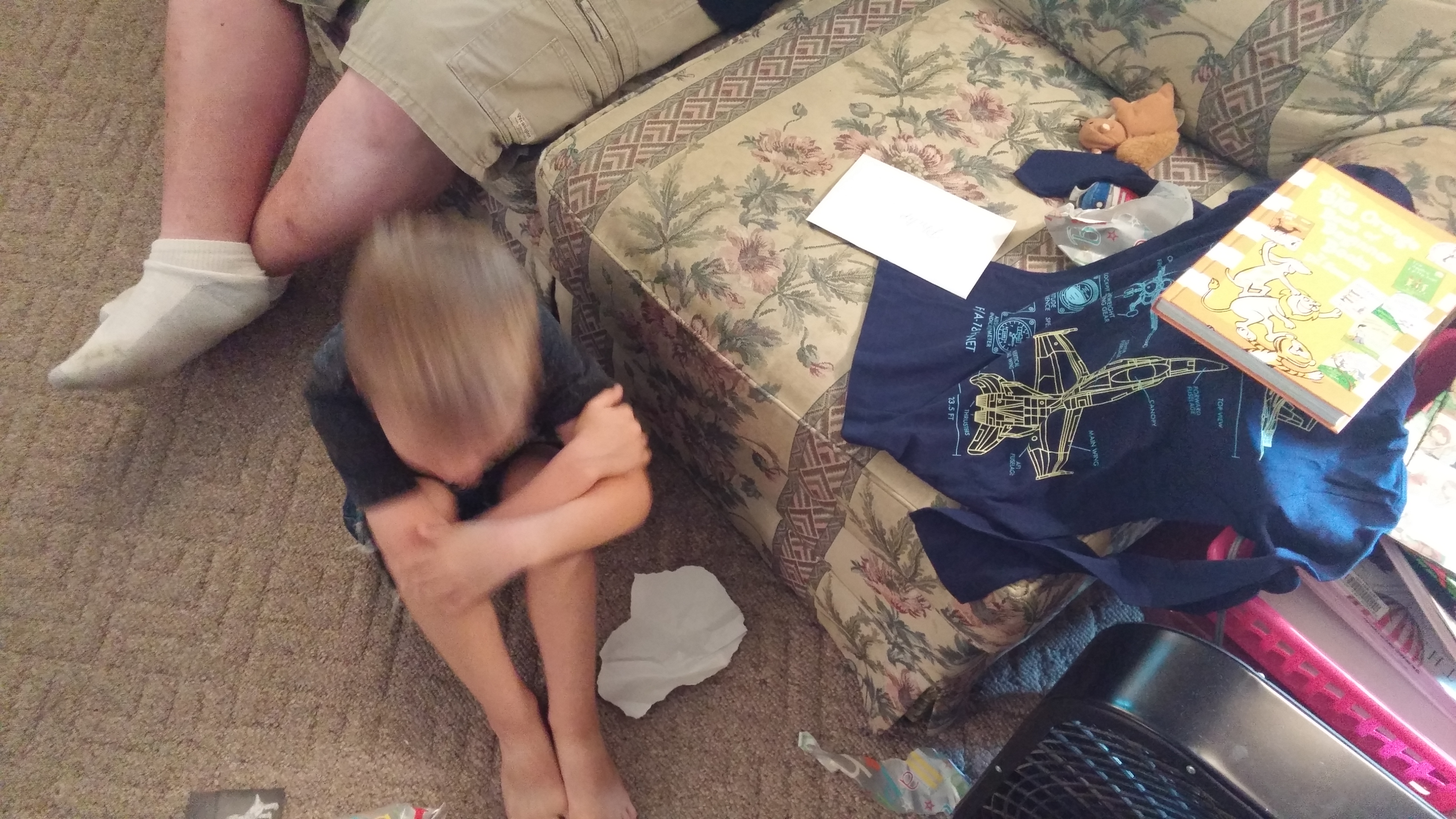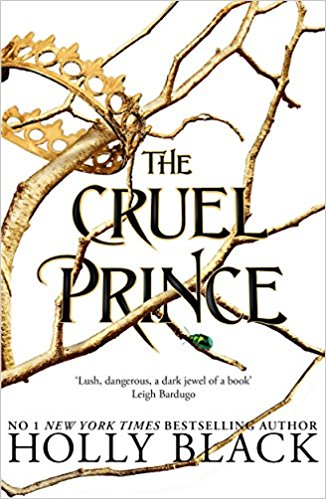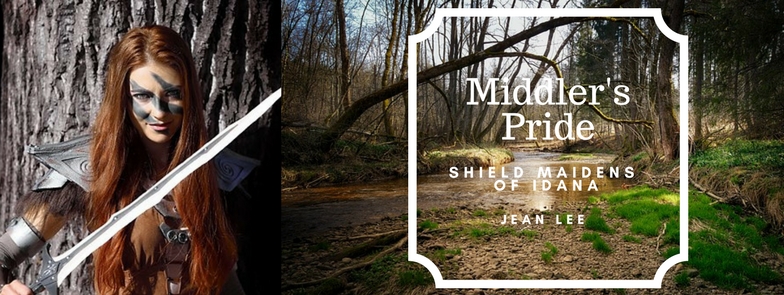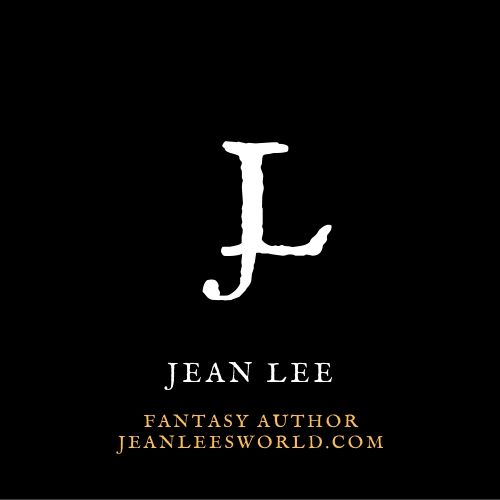Nobody cries crocodile tears quite like Bash.
“This is a SAD BIRTHDAY!” he wails, complete with a “WAAAaaaaAAAAaaaa” that could drown out a fire truck. My mother holds him, soothes him, to no avail.
Why the tears? Because “There are NO TOYS ARE PRESENTS! I WANT A TOY!”
Meanwhile, Biff sits content with his new collection of Disney Cars stories, and Blondie–who already shed her tears over the fact that today isn’t her birthday–eyes the cupcakes, knowing she at least gets sugar and a race car ring out of the deal.
Despite having received toys at the party hosted by in-laws less than 48 hours ago, Bash continues sobbing until bedtime. “This was a SAD BIRTHDAY,” he declares again, thoroughly traumatized.

Annoyed as I am, I can’t bring myself to scold him for his meltdown. Our basement flooded two weeks before his and Biff’s 6th birthday, sending the house into chaos. Everything is everywhere. Stuff’s crammed into the garage, piled in the living room. There’s a mattress and box spring tipped on their sides in the hallway. Decorations are somewhere in the labyrinth of tubs frantically filled as water seeped up through the seams of the house’s foundation. We’re all stepping on each other’s toys, books, and nerves.
It’s lousy.
But is it traumatic?
Sure, if you spin it right. Horror fiction’s got a knack for taking anything–like a ruined birthday party–and turning it into motivation for a killing spree.
But if you’re not out to birth a slasher, then what qualifies as “traumatic”?
TRAUMA : a very difficult or unpleasant experience that causes someone to have mental or emotional problems usually for a long time. medical : a serious injury to a person’s body. —Merriam-Webster Learner’s Dictionary
But sometimes that drive comes from what lies behind in the histories of the characters, and what lies behind them is often traumatic.
The most popular “trauma” I find in storytelling is personal loss. Take comic books, for instance. How many become superheroes because they lost a loved one? Batman–parents. Spider-Man–uncle. Green Arrow–parents. Punisher–family. Nightwing–parents. Flash–mother. Captain Marvel–parents. Daredevil–father. The list goes on for a looooooong time.
Now I’m not saying that personal loss isn’t traumatizing. I should know: I’ve watched grandparents waste away. I drove to the hospital thinking my father ill only to be told at the door he’d died of heart failure. Everyone else already knew, but didn’t want to say anything until after I’d arrived.
Loss fucking sucks, and you’re damn right it changes you.
But there is something cliche about a backstory of personal loss driving one to heroics. Must a character always become a warrior for justice when his parents are shot in a dark alley?

No. Take Jude in Holly Black’s The Cruel Prince. A Fae general comes into her house, kills their parents before her eyes, then takes her and her sisters back to the land of the Fae to raise them as his own. Is Jude driven to heroics?
She kills at least two people and readies herself to kill more out of loyalty to her new Fae court. She’s got the drive and calculating mind of her “new” Fae father.
Not sure what Bruce Wayne would make of that.
Trauma doesn’t require death, either. Consider Starlight from the comic book series The Boys. Of all the young superheroes, it is she who’s given the chance to leave her ultra-conservative group Young Americans and join the Seven, the most powerful group of heroes on the planet. She gets there, thrilled to take the last test and make a difference…
…only to discover the test is having oral sex with Homelander and two other members.
Do they force her? Use their own superpowers to render her helpless?
No.
Starlight consents.
And for the rest of the series she has to struggle with that decision and all its consequences.
Trauma’s not just about losing a piece from our lives, but a piece of ourselves. I know this first-hand. When your body becomes someone else’s thing, you don’t want it. You don’t want to take care of it. You want it to remain separate, the real you buried in the bile churning at the bottom of your gut. You separate your soul from your body because if you don’t, then your soul’s as worthless as your body, as much a nothing to be spat upon and left in the alley. That separation means survival.
But survival and living with oneself are two very, very different things. Trauma, from my experience, does not inspire love.
More like the opposite.
We survive. And we hate that we survive.
Athanasius, one of the little boys in my first short story “The Boy Who Carried a Forest in His Pocket,” was so desperate to flee his “survival” of an abusive home that he happily left with the first stranger he met. Fallen Princeborn: Stolen opens with Charlotte running away from an abusive home. We learn in the opening pages that she’s a fighter, so much so she’d rather punch out your teeth than listen to you talk.

That drive to violence–to hurt others before they can hurt us–that’s what trauma teaches us. This can easily drive a character to do terrible things to those around her. But it is also this drive that can be nurtured to make one want to defend others before they get hurt. It all depends on the character’s environment when the seed of trauma is planted.
Again, there doesn’t need to be some dark, extraordinary experience for a “traumatic event” with long-lasting impact. In my serialized novel Middler’s Pride, Meredydd recalls a moment in childhood when an evil sorcerer attempted to curse her family’s land, but was thwarted when child Meredydd interrupted the spell. Sounds pretty traumatic, running into an evil sorcerer. Yet Mer’s driven, obstinate attitude was the same before and after this event. Apart from shaking hands, her body’s the same before and after this event. So what drives her onward into the story’s narrative?

A childhood without affection. No one abused her, killed a loved one in front of her. Heck, the girl never even broke a bone, or went a day without a full belly. But year after year of watching her step-siblings receive love and attention while she must catch scraps of love from others outside her family…that can hurt far more than any magic curse.
So consider carefully, writers, whether or not your character truly needs trauma in her past for present-day motivation. Death can make its mark, but sometimes the mark need only be a scar, a touch, a moment of undulated terror. Or perhaps it need only be the gathering of little things, subtle as water beneath the ground to eventually flood over your character, altering her nature for the better.
Or worse.
Read on, share on, and write on, my friends!



